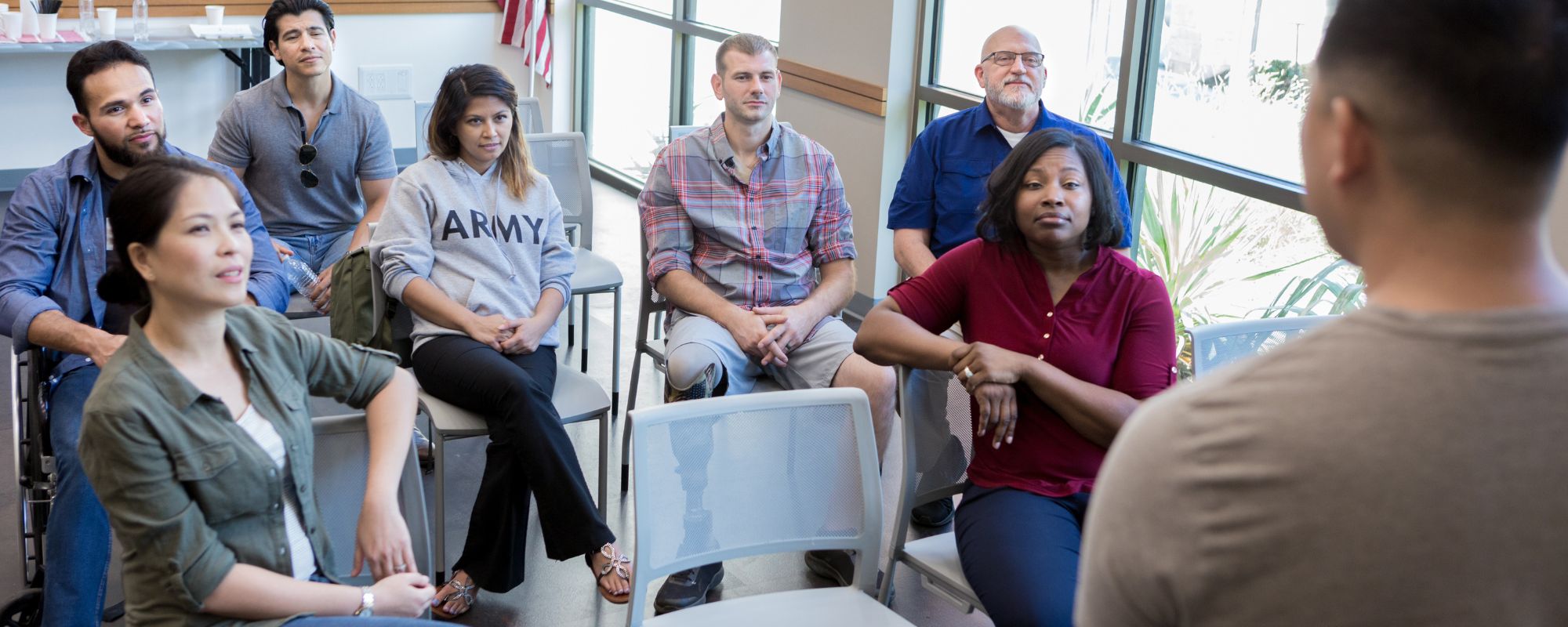If you’re searching for a “trauma and PTSD therapist near me,” you may be struggling with the lasting effects of traumatic experiences, post-traumatic stress, or even complex trauma. Whether the source is combat exposure, childhood trauma, substance abuse, or a difficult life transition, the emotional and physical impact can be overwhelming — but you are not alone.
At Aliya Veterans, we specialize in helping individuals like veterans and first responders who face unique psychological challenges due to service-related trauma. This guide will walk you through what PTSD is, what trauma therapists do, and how to find the right fit for your recovery journey.
What Is PTSD? Understanding the Impact of Trauma
Post-traumatic stress disorder (PTSD) is a mental health condition that can develop after experiencing or witnessing traumatic events such as combat, violence, disasters, or serious accidents. It’s more than just a psychological wound — PTSD can have a profound negative impact on your mind, body, and relationships.
Common PTSD Symptoms Include:
-
Nightmares and flashbacks
-
Panic attacks and anxiety
-
Avoidance of reminders of the trauma
-
Mood swings, irritability, or anger
-
Emotional numbness or detachment
-
Low self-esteem or shame
-
Physical symptoms like chronic pain, fatigue, or insomnia
Many people with PTSD also experience co-occurring conditions such as substance abuse, depression, or low self-worth. PTSD therapy can help people overcome trauma and lead a happy life.
Get confidential help from our addiction and mental health treatment facilities located across the United States. Call to join one of our quality programs today!
Speak With Our Admissions Team
What Does a Trauma and PTSD Therapist Do?
A trauma therapist is a licensed mental health professional who specializes in therapy for trauma, including PTSD, complex trauma, and related conditions. Their goal is to help patients process unresolved pain, reduce symptoms, and regain control of their lives.
Key Focus Areas for a PTSD Therapist:
-
Creating a safe space for healing
-
Identifying trauma triggers and stress responses
-
Helping patients build emotional resilience and coping skills
-
Working through trauma narratives and painful memories
-
Addressing self-esteem, shame, and setting boundaries
PTSD therapists often combine different therapeutic approaches to offer personalized, effective treatment that suits each client’s needs.
Types of Therapy and Therapeutic Approaches for PTSD
When searching for a trauma and PTSD therapist near me, it’s important to understand the various types of therapy that may be offered. No single approach works for everyone, so the right therapist will tailor your treatment to your personal history and goals.
1. Cognitive Behavioral Therapy (CBT)
Also known as cognitive behavioral therapy cbt or simply cbt therapy, this research-based approach helps people recognize and change unhelpful thought patterns and behaviors. It’s one of the most researched and effective treatments for PTSD and anxiety.
-
Helps reduce PTSD symptoms, depression, and anxiety
-
Focuses on present-moment challenges
-
Teaches tools for managing panic attacks and negative thoughts
2. Cognitive Processing Therapy (CPT)
A specialized form of CBT used specifically for PTSD, especially combat trauma. CPT focuses on helping people process and reframe harmful beliefs developed after trauma.
3. Eye Movement Desensitization and Reprocessing (EMDR)
Also referred to as desensitization and reprocessing emdr, this powerful therapy helps reduce the emotional intensity of traumatic memories. It uses eye movements or tapping to access and heal deep emotional wounds.
4. Dialectical Behavior Therapy (DBT)
Dialectical behavior therapy dbt or dialectical behavioral therapy is ideal for individuals with intense emotions or self-destructive behaviors. It helps with emotional regulation, interpersonal effectiveness, and developing mindfulness.
5. Psychodynamic Therapy
This form of psychotherapy focuses on unconscious processes rooted in childhood trauma. It strengthens the therapeutic relationship and uncovers deep emotional patterns that affect current behavior.
6. Motivational Interviewing
This approach is often used in combination with addiction treatment or substance abuse recovery. It helps patients identify their internal motivations for change — a useful tool when they feel stuck or ambivalent about seeking help.
Looking for quality treatment for substance abuse and mental health that’s also affordable? Aliya Veterans treatment facilities accept most major insurance providers. Get a free insurance benefits check now!
Check Your CoverageWhat to Look for in a Counseling Center or PTSD Therapist
If you’ve typed “trauma and PTSD therapist near me” into a search engine, you’re probably wondering: How do I know who’s right for me?
Here’s what to look for in a mental health professional or center:
1. Trauma-Informed Expertise
Your therapist should be experienced in treating trauma, not just general anxiety or depression. Ask about training in trauma therapies like CBT, EMDR, or DBT.
2. Personalized Therapeutic Process
The therapeutic process should be collaborative and tailored to your unique needs, not a one-size-fits-all plan.
3. Safe, Supportive Environment
A good therapist offers a safe space to explore your trauma without judgment. The right type of counseling respects your pace and boundaries.
4. Focus on Helping Veterans and First Responders
Your experiences are unique. A center like Aliya Veterans understands the emotional weight of service, sacrifice, and life transitions.
5. Comprehensive Care
A quality center will integrate trauma therapy with support for co-occurring conditions like substance abuse, anxiety, or low self-esteem.
Aliya Veterans: Expert Trauma and PTSD Treatment You Can Trust
At Aliya Veterans, we’re dedicated to helping people who have served in high-stress, high-impact roles — including military service members, veterans, police, EMTs, and firefighters.
Our Trauma Therapies Include:
-
Cognitive behavioral therapy (CBT)
-
Dialectical behavior therapy (DBT)
-
EMDR (Eye Movement Desensitization and Reprocessing)
-
Motivational interviewing
-
Psychodynamic therapy
-
Art and expressive therapy
-
Group therapy and peer support
Our goal is to help you heal from post-traumatic injuries — emotional and psychological — and to empower you with tools for long-term recovery and resilience.
It’s Time to Seek Treatment for Trauma
If you’re experiencing PTSD symptoms, anxiety, or emotional distress from past trauma, you don’t have to navigate it alone. The right therapist can make all the difference in your recovery.
Searching for a “trauma and PTSD therapist near me” is a powerful first step. Now it’s time to take action.


- Pill Mills: What Veterans Need to Know About a Dangerous Practice - January 28, 2026
- Trauma and Addiction: Understanding the Connection and Paths to Healing - January 27, 2026
- Rehab Centers for Veterans: Healing from PTSD and Addiction - January 26, 2026













